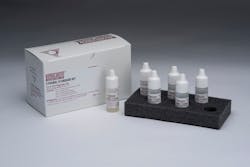Verichem Laboratories has announced the availability of a liquid stable and ready-to-use set of multi-level clinical reference materials intended for the calibration and calibration verification of Ethanol assays on a wide array of diagnostic testing systems.
These reference materials are expressly designed to be treated as patient specimens and feature universal instrument compatibility, making them available for use on a wide assortment of clinical instrument systems, including those from Abbott, Beckman Coulter, Roche, and Siemens, among others.
Verichem’s clinical reference materials for Ethanol come in a ready-to-use, liquid stable format which incorporates the serum-like reactivity of a protein based matrix, coupled with the volumetric accuracy of an absolute standard. The product’s CLIA compliant set point designs, at or near decision cut off concentrations, are vital for the determination of test method accuracy, sensitivity, linearity, and reportable range. Plus, the unique bio-synthetic matrix, which is free of surfactants, glycols, azides, and other interfering substances, allows for maximum product stability and exceptional lot-to-lot consistency, while the six (6) available concentration levels are all verified using available Standard Reference Materials from the National Institute of Standards and Technology (NIST).
Verichem’s clinical reference materials for Ethanol are ergonomically packaged in a kit format containing five milliliters (5.0 mL) of material at each six (6) available concentration levels, along with a Certificate of Analysis, indicating accuracy traceability and actual lot testing data. All of the materials are filled within easy-to-use, translucent polyethylene dropper vials and feature an exceptional shelf-life stability claim of eighteen (18) months when stored at refrigerated temperatures of 2° to 8°C. As an added bonus, the product also contains the components Acetaminophen, Lactate, and Salicylate, with concentration all within a known linear relation, that may also be used to determine the calibration verification of these clinical assays as well.

